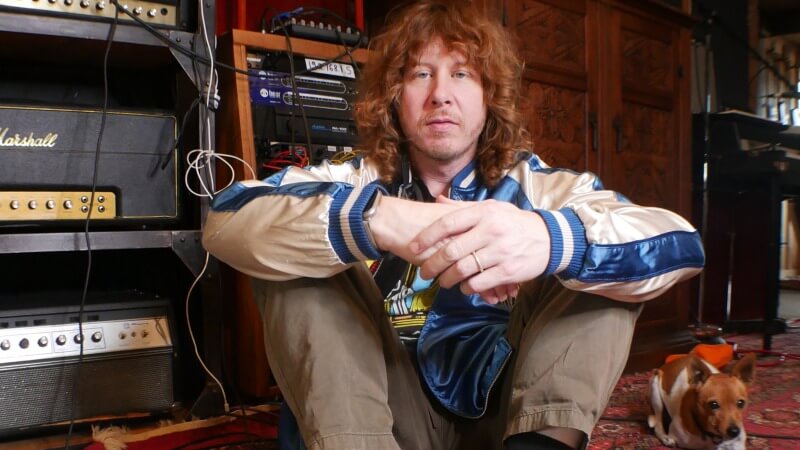Ben Kweller Is Still Here
Grief is central to the Texas singer-songwriter’s new album, Cover the Mirrors. But it’s not the whole picture.
Photo by Liz Kweller
Dorian Zev Kweller was killed in a car accident on February 27th, 2023. Texas-based singer-songwriter Ben Kweller announced his son’s passing on Instagram days later. It was matter-of-fact, laying bare all of the emotions you would expect from a grieving parent: immeasurable sadness, disbelief, disappointment, and frustration. Dorian’s obisttuary, too, laid bare the facts of his brutally untimely death the way few obituaries do. It was a car accident; an oncoming truck veered into Dorian’s lane and he pulled over to the shoulder to avoid it; a downed tree on the shoulder went through the window and hit him in the head, killing him instantly. At the time, Dorian—a budding songwriter himself operating under his middle name, ZEV—was freestyling over one of his favorite instrumental tracks. “He would’ve walked away from this had it not been for that one branch,” the obituary, written by his parents, reads. “When Dorian was born, our main wish for him was to have a zest for life. That wish came true x100. Our baby was riding high until his final minute on earth.”
In the time that he wrote those words, Ben Kweller was mourning. His family—his wife Liz and their second son Judah—were right there with him. In Judaism, there is a practice after loss called “sitting shiva,” where the family and loved ones of a deceased person spend seven days simply grieving. Kweller is private in his own religious beliefs, but a part of the Shiva process felt apt for the moment after Dorian’s passing—when it came time to put a name on the music that spawned from the unthinkable. “One thing that you’re supposed to do is you’re supposed to cover all the mirrors in your house so you can’t see your reflection, because you’re just supposed to get rid of your ego entirely,” Kweller says. That’s why he chose Cover the Mirrors.
Kweller didn’t literally cover his mirrors, but the sentiment of leaving one’s self and ego behind appealed to him—because the story of Ben Kweller now, and the story of his new album, is not simply about him. It’s about the musicians he’s surrounded himself with, and it’s very much about Dorian, whose DNA is all over the music. But to say Cover the Mirrors is all about Dorian or the sitting shiva wouldn’t entirely be accurate, either. There’s plenty of the Ben Kweller we met when he was brushing his teeth in a goofy hat 25 years ago, with callbacks to the “Kweller-heads” in songs like “Park Harvey Fire Drill,” small vignettes into daily minutiae, and love-sick appeals to the heart.
A year after his old band Radish broke up, Kweller introduced himself to us as a 19-year-old man—still a kid, really—on Sha Sha in 2000. But his lyrics and songwriting ability belied his age from the jump, striking an emotional depth and consistency already at a level some artists spent entire careers chasing. Music was, seemingly, just something Kweller could do innately. And he backed it up with album after album of the same caliber: songs written for his now-wife Liz as if they were already this old married couple at 21; epic piano ballads that grew and grew with layers upon layers like “Falling”; the simplicity of a good, distorted guitar on songs like “Commerce, TX,” calling out his own slacker style—as if to say, “This kind of thing is hard for you? This is nothing to me.”
There are obvious portals into grief on Cover the Mirrors, especially on “Depression” (featuring Jason Schwartzman’s Coconut Records) and “Optimystic,” where Kweller teeters between “happiness / wanna die” and declares that he is “not optimistic now.” “There’s a sheen over the whole album of seriousness,” he says. “Even the moments that are carefree and fun, there’s still a little sadness.” Kweller, who describes himself as a “bright-side person,” and has an ineffable spirit and golden retriever energy even while drenched in sweat after a concert, says that “Optimystic” was the track that pushed him towards clarity. “I was like, ‘Okay, maybe I’ve broken.’ Maybe the Ben Kweller we knew finally broke in half and there is no light at the end of the tunnel. My whole life, there has been a light at the end of the tunnel.” He pauses for a second. “But I’ve come around since writing ‘Optimystic.’ That was just one day in my life. I generally do still see the light at the end of the tunnel, and I do believe everything happens for a reason. I always had a hunch about faith and things being written in the stars. And now that Dorian’s gone, I definitely believe that even stronger.”
It would have been perfectly reasonable, if not expected, for Kweller to have retreated inward or, at minimum, embraced a more embittered opinion of the world after his son’s death. Even before the album’s release, Kweller went back out into the world and played full-band shows, kicking things off in Austin more than a month before the album’s release. At a late April show in Philadelphia, he played the classics yet still introduced some of Cover the Mirrors, even if the fans didn’t know the words yet. Maybe those ones were just for him then. There was no temperature change in the room when the bouncy “Penny on the Train Tracks” turned into the explanation that “Somber” came from an idea Dorian had started but never finished. That night, even in a warm basement venue, Kweller covered his unruly red curls in a bright pink beanie, which once belonged to Dorian—another piece of him along for the ride.